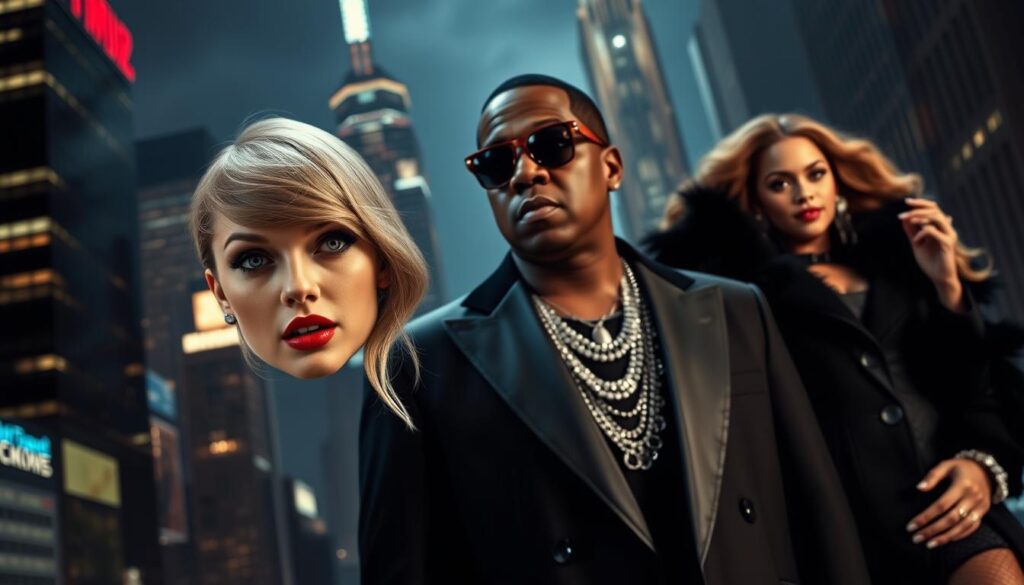In April 2024, Forbes confirmed that Taylor Swift achieved billionaire status with a net worth of $1.1 billion. She is the first musician to reach this milestone solely through her music and performances, without relying on side hustles like beauty brands or liquor deals.
Her wealth is built on a solid foundation. Over $500 million comes from music sales and touring, while another $500 million is tied to the value of her song catalog. Her real estate portfolio, valued at $125 million, adds the perfect finishing touch to her financial empire.
This achievement is rare in the music industry, especially when compared to tech billionaires like Jeff Bezos. Swift’s strategic moves, such as reclaiming her master recordings and the massive success of the Eras Tour, played a crucial role in her journey to billionaire status.
Key Takeaways
- Taylor Swift is the first musician to become a billionaire solely through music and performances.
- Her net worth of $1.1 billion includes $500M+ from music and touring.
- Her song catalog is valued at over $500 million.
- Her real estate portfolio adds $125 million to her wealth.
- Her success highlights the rarity of billionaires in the music industry.
Taylor Swift’s Billionaire Status: A Rare Achievement

Forbes’ billionaires list in April 2024 unveiled a remarkable milestone in the music industry. A pop icon achieved a net worth of $1.1 billion, making history as the first musician to reach this level solely through music and performances.
This recognition is no small feat. Unlike other artists who diversify into beauty brands or liquor ventures, this achievement stands out for its focus on music. 26.1 billion Spotify streams in 2023 became the secret sauce for royalty income, fueling this financial success.
Forbes’ Official Recognition
Ranked #2,545 on the 2024 Forbes’ billionaires list, this artist joins a select group of 2,781 billionaires worldwide. The $1.1 billion valuation reflects a diversified model, contrasting sharply with Bruce Springsteen’s $1 billion touring earnings and his $500 million catalog sale.
Unique Distinction Among Musicians
While Rihanna built her empire with Fenty Beauty and Jay-Z ventured into liquor, this artist’s wealth stems entirely from music. No perfume lines, no fashion collaborations—just pure talent and strategic business moves.
- Forbes confirmed the $1.1 billion valuation in April 2024.
- Spotify streams in 2023 generated significant royalty income.
- Contrasts with Rihanna’s and Jay-Z’s diversified ventures.
- Springsteen’s catalog sale highlights the uniqueness of this achievement.
- Absence from typical celebrity cash grabs sets this artist apart.
The Role of Music Royalties in Swift’s Wealth

Music royalties have become a cornerstone of wealth for top artists in the industry. For one pop icon, these earnings have been a cash cow, contributing significantly to a $1.1 billion net worth. Streaming platforms and album sales are reshaping how musicians earn their income, and this artist’s strategy is a masterclass in maximizing revenue.
Earnings from Streaming and Album Sales
In 2023, Spotify streams alone generated $130 million in income. With 26.1 billion streams, the per-stream rate adds up quickly. This income stream is a sleeper hit, often underestimated but incredibly powerful. Ownership of music rights boosts per-stream rates by 30-40%, making it a lucrative asset.
Here’s a breakdown of Spotify earnings:
| Streams | Earnings |
|---|---|
| 26.1 billion | $130 million |
The Impact of Re-Recording Her Catalog
Re-recording albums has proven to be a brilliant financial move. The “Taylor’s Version” strategy not only reclaims artistic control but also generates new revenue streams. Fearless (Taylor’s Version) is a prime example, outperforming legacy acts’ reissues. This approach has added $400 million to the value of her music catalog.
Shamrock Capital’s $300 million purchase of the original catalog highlights the mechanics of catalog valuation. By re-recording, the artist ensures higher earnings and ownership, making it a win-win for both creativity and finances.
- $130 million from Spotify streams in 2023.
- $400 million added through re-recorded albums.
- Ownership boosts per-stream rates by 30-40%.
- Fearless (Taylor’s Version) outperforms legacy reissues.
- Shamrock Capital’s $300 million purchase underscores catalog value.
The Eras Tour: A Financial Powerhouse

The Eras Tour has become a financial juggernaut, redefining the economics of live performances. With record-breaking ticket sales, merchandise revenue, and a concert film, this tour has printed cash at an unprecedented scale. It’s not just a concert series; it’s a money machine that has reshaped the industry.
Record-Breaking Ticket Sales
The first leg of the Eras Tour grossed over $700 million in ticket sales alone. With a post-tax profit of $190 million, it’s clear why this tour is a financial powerhouse. For comparison, Madonna’s entire career touring revenue totals $1.6 billion, making the Eras Tour’s $1 billion+ gross even more impressive.
Merchandise and Concert Film Revenue
Merchandise sales added another $225 million to the tour’s earnings. With an average spend of $45 per attendee across 4 million fans, the demand for tour-themed products was insatiable. The concert film, released with limited screenings, capitalized on FOMO-driven demand, earning $35 million in its opening weekend.
Here’s a breakdown of the tour’s financial impact:
| Category | Revenue |
|---|---|
| Ticket Sales | $700M+ |
| Merchandise | $225M |
| Concert Film | $35M |
An unexpected side effect of the tour was the NFL partnership, which boosted brand value by $331.5 million. This collaboration highlighted the tour’s cultural impact beyond the music industry.
- $190 million net profit from the first leg of the tour.
- Eras Tour’s $1 billion+ gross contrasts with Madonna’s $1.6 billion career total.
- Limited screenings of the concert film created FOMO-driven demand.
- $45 average merchandise spend per attendee.
- NFL partnership added $331.5 million in brand value.
Strategic Business Moves: Owning Her Masters

Taking control of her music rights was a pivotal moment in her career. This decision not only secured her financial future but also set a new standard for artists in the industry. By reclaiming her masters, she ensured that her creative work remained under her control, a move that has paid off immensely.
The Scooter Braun Controversy
In 2019, Scooter Braun acquired Big Machine, the label that owned her early catalog. This deal sparked a public outcry, as she had no prior knowledge or consent. She took to Tumblr to express her frustration, a rare moment of transparency in the industry. This post became a rallying cry for artists seeking greater control over their work.
Her response was strategic. She played hardball, refusing to stay silent. This controversy highlighted the importance of owning one’s masters, a lesson that resonated with musicians worldwide. The fallout from this deal led to her next major move: switching labels.
Switching Labels for Greater Control
In 2020, she signed a groundbreaking deal with Republic Records under Universal Music Group (UMG). This agreement guaranteed her ownership of all new masters, a stark contrast to her previous arrangement. The terms of the deal were a sweetheart deal, offering her unprecedented creative freedom and financial benefits.
Her first releases under UMG, Folklore and Evermore, showcased this newfound independence. These albums were critically acclaimed and commercially successful, proving that owning her masters was a smart business move. The UMG deal also ensured that she retained publishing rights, adding significant value to her catalog.
| Event | Impact |
|---|---|
| 2019: Scooter Braun acquires Big Machine | Loss of control over early catalog |
| 2020: Signs with Republic Records | Ownership of new masters, creative freedom |
| 2020: Releases Folklore and Evermore | Critical and commercial success |
By reclaiming her masters, she gained a significant percentage of her publishing rights. This move not only increased her earnings but also set a precedent for other artists. Her journey underscores the importance of strategic business decisions in the music industry.
Real Estate Investments and Their Contribution

Real estate has quietly become a cornerstone of her financial empire, adding millions to her net worth. With a property portfolio valued at $150 million, these investments are a hidden gem in her wealth strategy. From Beverly Hills mansions to a Rhode Island coastal compound, each property tells a story of smart money decisions.
Swift’s Property Portfolio
Her real estate journey began at 19 with a Nashville penthouse, purchased for $1.9 million. Today, it’s valued at over $15 million—a staggering 7900% appreciation. This is often called the best teen investment ever. Her portfolio spans five properties, each chosen for its long-term value and strategic location.
Here’s a breakdown of her key properties:
| Property | Purchase Price | Current Value |
|---|---|---|
| Nashville Penthouse | $1.9M | $15M+ |
| Beverly Hills Mansion | $25M | $40M |
| Rhode Island Compound | $17.75M | $30M |
How Real Estate Boosts Her Net Worth
Real estate isn’t just about owning luxury homes; it’s a revenue stream. During tour downtime, properties are leased, generating passive income. This strategy contrasts with Jay-Z’s asset-heavy approach, focusing on diversification rather than accumulation.
Comparing real estate returns to music income reveals its value. While her music catalog is worth $500 million, her properties offer steady appreciation and rental income. This dual approach ensures financial stability and growth.
- Nashville penthouse: 7900% appreciation since purchase.
- Leasing properties during tours adds passive income.
- Real estate returns complement $500 million music catalog.
- Contrasts with Jay-Z’s asset-heavy portfolio strategy.
- Properties chosen for long-term value and strategic locations.
Comparing Swift to Other Billionaire Musicians

When it comes to billionaire musicians, the paths to wealth are as diverse as their music. While some rely on touring and royalties, others diversify into beauty brands or fashion. This apples-to-oranges comparison highlights the unique strategies behind their financial success.
Bruce Springsteen and Touring Success
Bruce Springsteen is a legend in the music industry, but his financial journey differs significantly. His $500 million catalog sale was a one-time windfall, contrasting sharply with ongoing royalty streams. While Springsteen’s touring success is undeniable, it’s a different model compared to retaining ownership of your work.
For example, Springsteen’s $1.6 billion career touring revenue is impressive, but it took decades to achieve. In contrast, the rapid ascent of the Eras Tour shows how modern strategies can yield faster results. This highlights the evolving nature of the music business.
Rihanna’s Diversified Income Streams
Rihanna took a different route, building her $1.4 billion net worth through Fenty Beauty. Her 50% stake in the brand is a riskier but higher-upside model. While Swift’s wealth stems solely from music, Rihanna’s diversified approach showcases the potential of side ventures.
However, this model isn’t without challenges. Fenty’s success relies on market trends and consumer demand, making it less predictable than music royalties. This contrast underscores the unique stability of a music-focused strategy.
- Springsteen’s catalog sale was a one-time event, while Swift’s royalties are ongoing.
- Rihanna’s Fenty stake offers higher upside but comes with greater risk.
- Madonna’s $850M net worth pales in comparison to Swift’s rapid $1.1 billion milestone.
- Swift ranks 5th in Forbes’ Power Women, while Rihanna sits at #74.
- Beyoncé’s $100M tour profit sets a benchmark for the Eras Tour’s dominance.
Taylor Swift’s Legacy: Redefining Success in Music
Her journey to billionaire status has reshaped the music industry, setting new standards for success. By reclaiming her catalog, she sparked industry-wide contract reforms, empowering artists to take control of their work. This move changed the game, proving that ownership is key to long-term financial stability.
The Eras Tour wasn’t just a concert series; it was an economic powerhouse. Studies show it boosted local businesses by over $5 billion, showcasing her influence beyond music. Her fanbase, known for their loyalty, drives demand for merchandise and tickets, creating a multiplier effect on her earnings.
With the upcoming release of Tortured Poets Department, projected to earn $200 million in its first year, she continues to write the rulebook for success. Her legacy as a singer and entrepreneur serves as a blueprint for the next generation of artists, proving that talent and strategy can redefine an industry.
